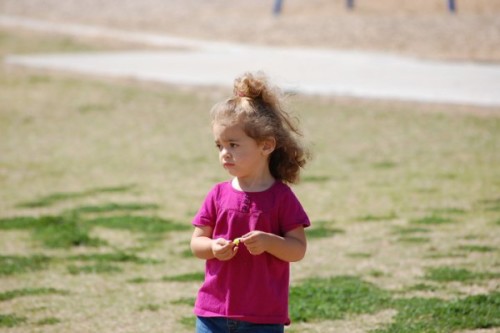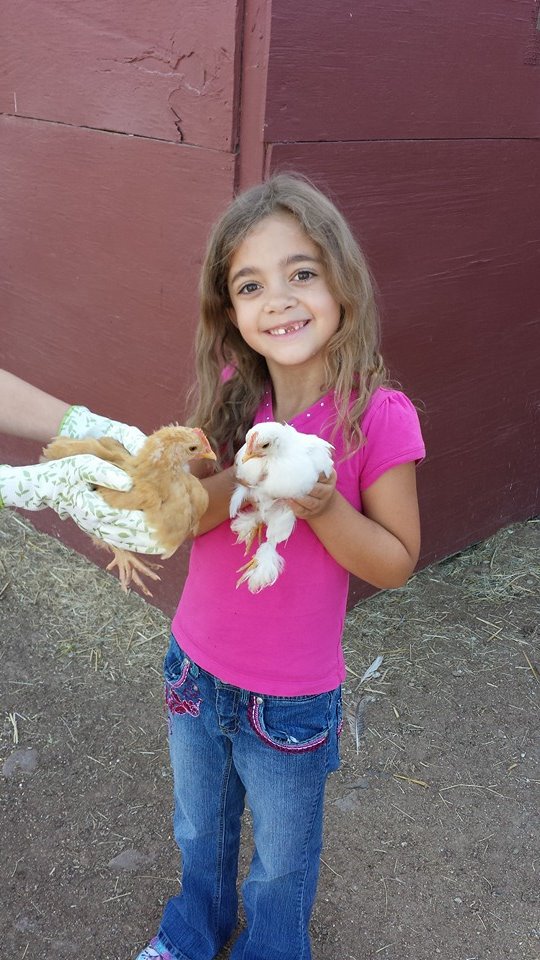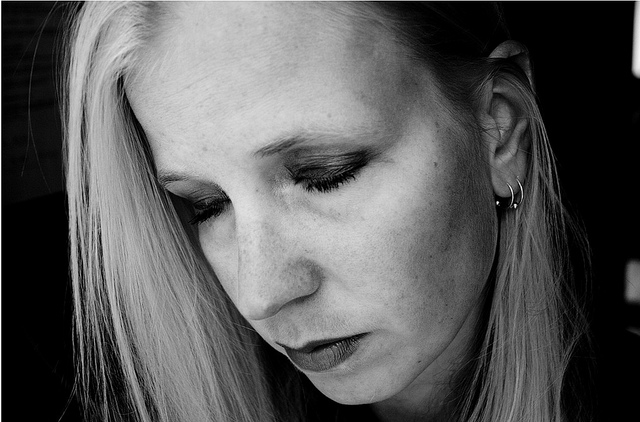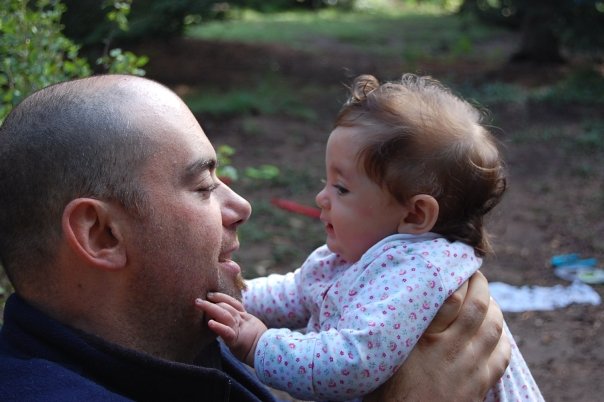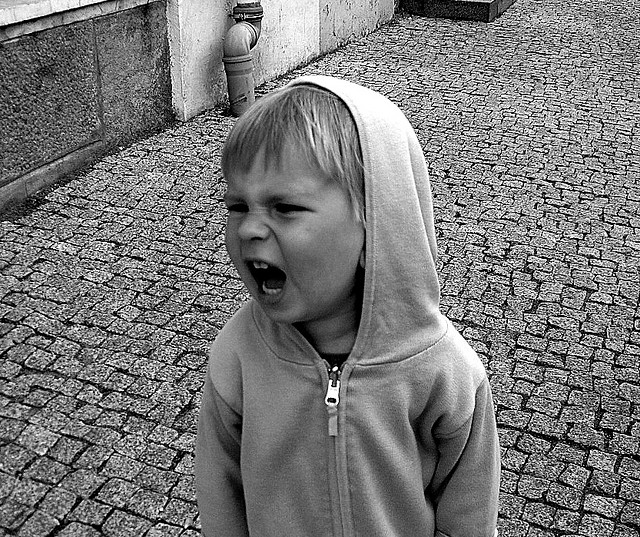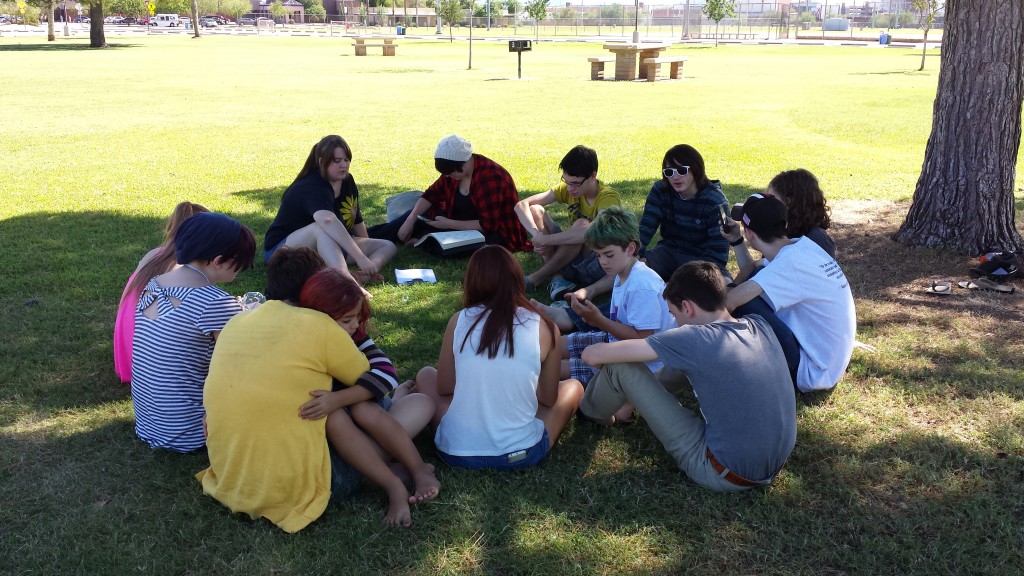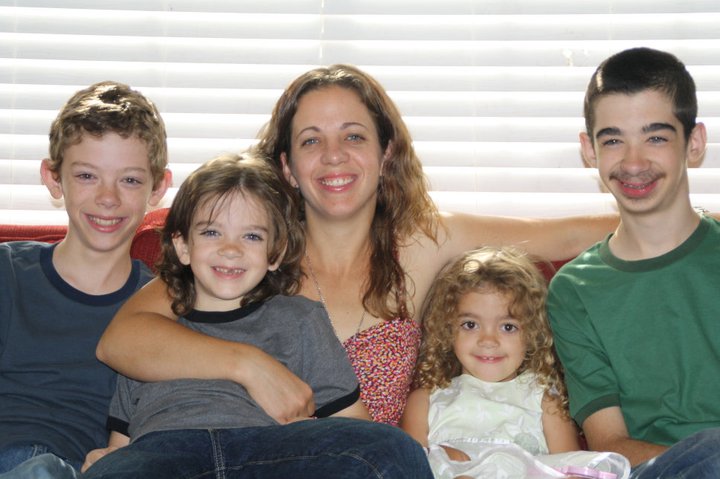
I have four kids who’ve never been spanked. I would like to say that they’ve never been punished at all, but while we’d resolved from the very beginning not to physically hurt our children, moving away from punishments completely took a little more time. Thankfully, our youngest three have grown up with no punishments of any kind (which, as it always stands to be said again, is not the same thing as growing up without discipline. The two words are not synonymous.)
For lots of other families though, the decision comes much later…. after they’ve already used spankings and/or timeouts and other traditional parenting methods. They’re convicted by something they’ve read, or by a friend or family member, or maybe just because they feel an inner stirring that something isn’t right. Whatever the reason, they resolve to stop spanking and punishing, and feel really confident about their decision.
And then – not always, but often – there’s that moment of sheer panic.
One question that I get a lot, in various forms, is this:
If I don’t spank, what do I do?
And I get it. I do. It’s one thing to embrace a philosophy, and quite another to feel equipped in that moment when your child sticks a pen through a sofa cushion just to see what will happen… or shoves (another) sandwich into the slot in the VCR… or throws her brothers shoes into a lake… *
The question is a good one, and the answer far too involved to fully cover in one blog post. My hope is that the following list will serve as a good place to start.
1. Change your perspective.
The reason that there’s no one single answer to the question, “What do you do instead of spanking?” is that moving away from punishments requires an entirely new mindset. It’s not a one-for-one deal. Punishments (and their cousins, rewards) reduce your interaction with your children to a transaction: you apply some sort of prescribed action, and you – hopefully – get a desired result. But that’s not the way respectful relationships work. At least it shouldn’t be! You shouldn’t try to control your children through punishment, fear, and manipulation tactics any more than you should do so to your spouse, or sister, or best friend. So while it is imperative that you learn and practice peaceful tools for dealing with stressful situations (more on that in point two), your entire perspective also needs to shift before you can really understand gentle parenting. It’s not about control; it’s about connection. It’s not about rules; it’s about relationships. You’re going to have to ask yourself, possibly over and over again, “Is what I’m about to do/say going to bring me and my child closer together, or draw us further apart?” But wait, that sounds like work. Wouldn’t it be easier just to spank? Well… yes! It takes time, and care, and effort to parent without punishments. In order to commit to parenting with more mindfulness and respect you need to be all in. You need to realize and recognize that your children aren’t yours to control, but are their own unique, living, breathing HUMANS, who deserve to be treated with as much care and consideration as you’d extend to any other person that you loved. The parent/child relationship is one of the most important relationships you will ever have. And just like any key relationship, it needs to be nurtured in order to stay healthy and strong. Shifting your focus to your relationship with your child – and to making it sweeter, and kinder, and gentler – takes effort, to be sure, but it is by far one of the most rewarding things you can do….. for you and your child both.
2. Equip yourself with positive tools.
So you’re working on changing your perspective, you’re focused on the relationship… and then the 2 year old gets angry and hurls a remote control at her brother’s head. What do you do? The nice thing is that the more connected you are with your child, the easier it is to react with patience in the moment. You’ll know your child, you’ll know yourself, and you’ll figure out how best to problem-solve together. Before you can problem-solve though, you need to diffuse the immediate issue. Here are a few great places to start:
Breathe. It sounds like a cliche, but it’s not. Unless someone’s in imminent danger, your very first response (especially if you’re angry or frustrated) needs to be breathing! Take a deep breath before you speak. Take 20, or 100. Intentional breathing sends oxygen through your body, releases endorphins, slows your heart rate, calms your adrenaline, and reduces stress and anxiety.
Listen. Behavior doesn’t exist in a vacuum. Really stop and listen to what your child is trying to tell you. Are they tired? Frustrated? Angry? Not feeling heard? Just experimenting? Find out the WHY behind the behavior, and you’ll know better how to proceed.
Empathize. One of the most powerful and healing gifts someone can give us is empathy, and children are no exception. Let them know that you hear what they’re saying, and that you understand how they’re feeling.
Redirect. So much of what young children are punished for is completely normal and age-appropriate explorations. Children learn from these explorations, so the last thing we want to do is punish them for it! Instead, when your child does something unsafe, unkind, etc, consistently stop the behavior with a simple explanation (the younger the child, the fewer the words you should use), and move them on to a new activity. With time and patience – and a parent by their side – they learn.
Take a time-IN. Sometimes, what everyone needs is a change of scenery. Pretty much the opposite of a time-out, which separates you from your child at a moment when they’re most needing connection, a time-in gives you both a chance to breathe, re-group, and get re-connected, together. A time-in can consist of any sort of new activity that you and your child find enjoyable. There’s a long list of suggestions here.
3. Walk beside them as they learn to safely navigate the world.
One of the things that I hear people say a lot is that they only spank for the most serious of infractions, such as safety issues. I call it the, “But how will they learn to stay out of the street??” defense. And it sounds reasonable enough. If ever there was a time to spank, it’d be when their life was on the line, right? But I couldn’t disagree more. I actually think that safety issues are one of the weakest arguments for spanking, and here’s why: any good parent’s gut instinct is going to tell them to react, and react in a hurry, if their child is in harm’s way. Your toddler’s headed for a busy street, you react. Your baby’s about to stick a fork into an electrical outlet, you react. And your facial expression, your words, your tone of voice, and your body language as you quickly move them to safety teach them everything they need to know…. without teaching them that they also need to fear pain at your hands as they’re learning. Navigate life with them. Hold their hands when they cross the street. Show them how to safely carry scissors and make toast and start a fire. Help them keep their footing on the rocky trail. BE THERE with them as they figure out how life works, and they will naturally gain confidence and independence, all without ever having been punished for getting it wrong.
4. Show them what respect looks like.
Along the same lines as number 3, children are not born knowing how to interact respectfully with the people around them. They count on us as their parents to show them. They don’t need punishments to learn that words are more effective than hitting for solving conflicts. They don’t need punishments to learn that it’s unkind to call somebody stupid. They don’t need punishments to learn that it’s impolite to tell Grandma that the dinner she spent two hours making tastes “gross.” What they need is a parent who shows up; who shows them what it means to be respectful; who intervenes when they’re doing something that makes someone else feel sad, or scared, or uncomfortable; who interacts with them, and for them as they learn the intricacies of sharing our planet with others. One of the biggest misconceptions that I think people have about gentle parenting is that it is the same thing as permissive parenting. The two are actually polar opposites. One is conscientious, and the other is neglect. If you see a parent who is sitting back and just watching as her child does something that is disrespectful or somehow harmful to someone else… that is not a gentle parent. That is someone who is failing to be a parent.
Show up. Be there. Help them navigate.
5. Don’t sweat the small stuff (and it’s ALL small stuff).
A couple of years ago, a video went around Facebook that showed the aftermath of two unattended kids with a 5 lb bag of flour. There was flour all down the hallway. On the couches. On the chairs. On the kids. In the carpet. In the drapes. Flour everywhere. All five pounds of it. Part of me for sure felt sympathy for the mom who filmed it because I’ve been there. And oof. The clean-up. But another part me said, “Eh. Small stuff.” If you’re going to have kids, you’re going to have messes. Things are going to be broken and spilled and smeared and dumped and spread. It’s all part of the experience. And the greatest thing I learned between child one and child four (besides to stop and take a picture before I do anything else, because those photos are treasured later) is that that stuff just doesn’t matter. People matter. Love matters. Messes, accidents…. it’s all just “stuff.” Not worth getting upset over, and certainly not worth yelling or punishing over. And just like with anything else, with time and patience and consistency, they really do learn to keep the flour in the bag.
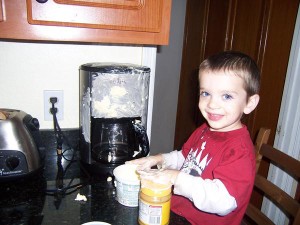
6. Know their triggers (and yours).
Stop me if this sounds familiar. You head out bright and early with your toddler to run a long list of errands. You know he’s going to be missing his morning nap, but he’ll catch a few minutes of sleep in the car. He’s pretty amiable for the first few stops. He helps pick out the apples at the grocery store. He enjoys his lollipop from the bank teller. He starts getting antsy at the dry cleaners, pulling at your pant legs, whining, and rubbing his eyes. Back in the car, you reach in your bag to get his little tupperware container of Cheerios, but realize you left it on the kitchen counter. You know you should probably head home, but you decide to squeeze in just one more stop. You’re in the drug store when he reaches meltdown mode. He cries when you pick him up, and cries harder when you set him down. Tired, hungry, bored, and overstimulated, he doesn’t want to walk, doesn’t want to be carried, and eventually settles for sitting on the floor as the tears fall and the screams escalate.
We’ve all got our triggers. And we’ve all got our breaking points. If adults get cranky and unreasonable when they’re tired and hungry (and we all know adults for whom this is the case, or we *are* an adult for whom this is the case) how much more understandable is it for a child? Taking care to ensure that basic needs are met, that kids are fed and rested and attended to can go a long way towards more peaceful outings and more pleasant interactions for all. My kids are older now – at the time of this writing they are 18, 15, 11, and 7 – but even now I know who isn’t at their happiest in the mornings. I know who is very sensitive to the feeling of being left out. I know who works best when their surroundings are neat and tidy. I know who has a hard time handling even a small lack of sleep. Being aware, and respectful of, both our own triggers and the triggers of our children allows us to treat each other with more care, and more kindness. It is categorically unfair, not to mention incredibly unkind, to ignore someone’s personal “buttons”, and then punish them for the reaction that we knew was coming.
7. Practice the golden rule.
A lot of parents seem want to want to demand respect from their children, just because they’re the adults, but don’t treat their children in a manner that’s particularly deserving of that respect. The age-old adage of treating others the way you’d like to be treated yourself applies not just equally, but more when it comes to your children. They are looking to you as their example. They are learning from you how to treat people. If you want your children to be respectful, treat them with respect. If you want your children to be polite, be polite when you speak to them (and to each other!). If you want your children to embody kindness and compassion and humility and generosity, show them what it looks like.
8. Take care of YOU.
There seems to be a general push by society to get away from your kids. From the importance of regular “date nights”, to putting them in daycare and preschool at a young age, to extended vacations without them… there’s no shortage of advice telling us to separate. I tend to believe the opposite: I think it’s very important that we’re with our kids as much as possible (especially when they’re young), and that true independence will happen naturally and easily when it’s allowed to happen on their time, not ours.
That doesn’t mean though that I don’t think self-care is important! On the contrary, it’s almost impossible to properly care for someone else when you’re not first taking good care of yourself. Even when you need to force yourself – or more accurately, especially when you need to force yourself – caring for your own needs (be they physical, social, emotional, spiritual, intellectual, creative….) is an integral part of parenting well. I can’t speak for all moms, but I find it way too easy to lose myself in my kids, and go go go until I’m exhausted and cranky and burnt out. And I learned somewhere along the way that when the kids and I get off-track, when people are out of sorts, when behavior starts getting wonky…. nine times out of ten it’s because I’ve been neglecting myself, which then caused me to be snippy and impatient and disconnected. When I focus on taking better care of me, I’m able to then have the proper wherewithal to give my kids what they need as well. Kids need a parent who is fully invested. And in another cliche that’s turned out to be true: You can’t fill your kids’ cups until you’ve filled your own.
[color-box] BONUS: Looking for more specific suggestions for when your child hits, or tells you “no”, or has a hard time transitioning? Download my free PDF, listing ten of the most common (and most frustrating) toddler/young child behaviors, along with specific examples of what you can say and how you can respond gently and without punishment. [/color-box]
Moving beyond punishment, and parenting with connection instead of control, takes deliberate and mindful choices, as well as an ongoing commitment and effort (at times, a lot of effort). And the reward is not in some hypothetical promise of how my kids are going to “turn out” some day. No, the beauty of gentle parenting is in the relationship that I enjoy with my kids right now… a relationship that’s sweeter and closer and more connected than I know it would be otherwise. Having children that are kind hearted and respectful and compassionate? That’s just a bonus.
———————————————————————-
P.S. I am working on a month long, premium course that dives much deeper into each of the eight points above. Make sure you’re on my mailing list if you’d like to receive a notification of its release.
* Examples may or may not have been taken from my own life.


